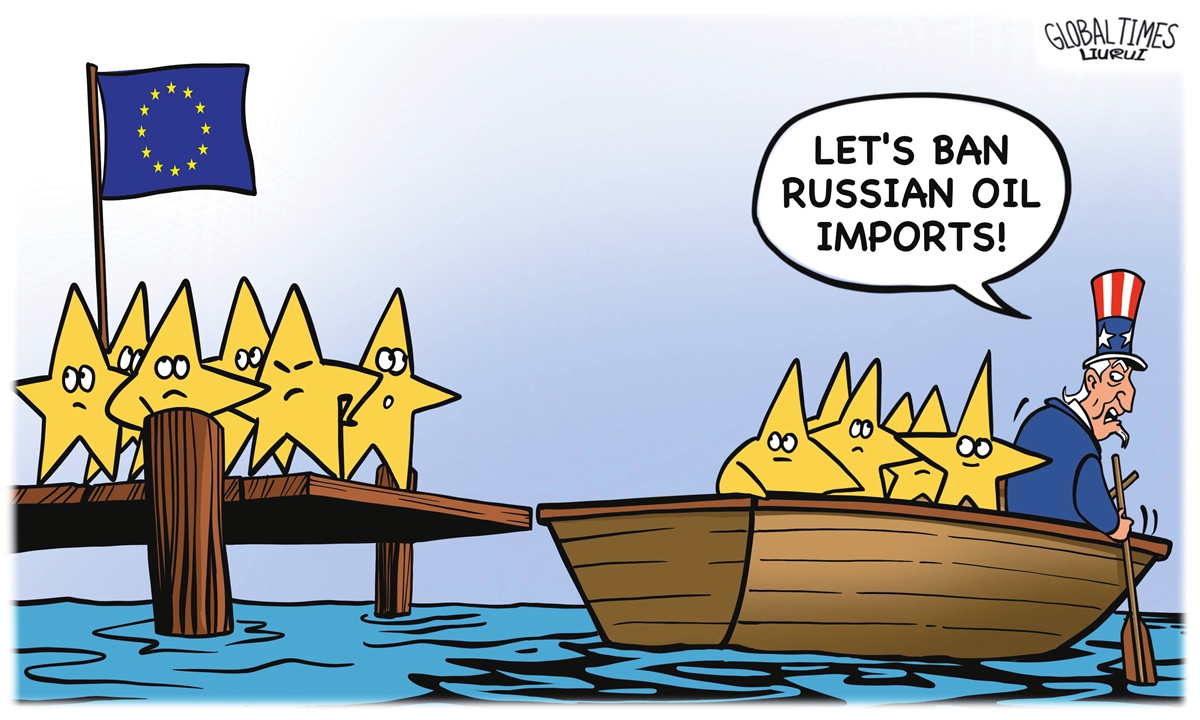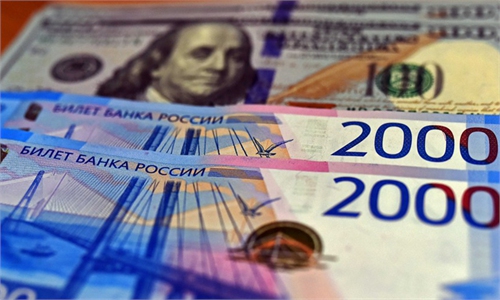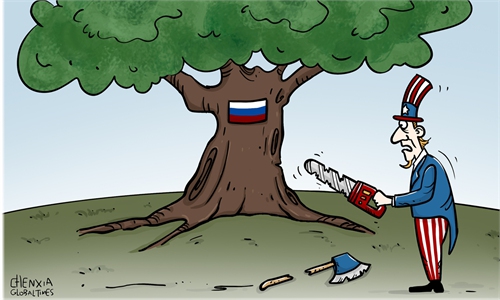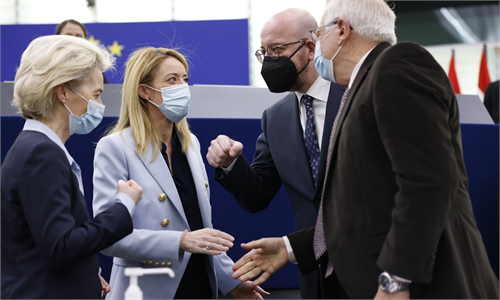Shaky unity of Western powers collapses as sanctions against Russia hurt practical interests

Cracks between US and Europe on sanctions Illustration: Liu Rui/GT
After weeks of wrangling and rounds of negotiations, the sixth round of EU sanctions on Russia was unveiled this week. European Council President Charles Michel said the latest agreement, reached during the EU leaders' summit, covers more than two-thirds of oil imports from Russia. Yet most reports and tweets from the West downplayed one fact - pipeline imports will be exempt from the sanctions, meaning some land-connected countries get a free pass to keep importing Russian energy.
It is unknown how much Russia will be hurt by the latest ban. However, it can be anticipated some European countries will face severe energy difficulties in the coming winter. Apart from that, what does the EU gain from the newly announced sanctions? Perhaps merely a chance to showcase their so-called unity.
The truth is, the fancy bubble of the West's solidarity was punctured the day before the summit, when German Economy Minister Robert Habeck on Sunday expressed that EU's unity was "starting to crumble," since some countries are struggling to agree on an embargo against Russia. Growing signs show that the Western coalition against Moscow is fragile and is fraying when the members have to shoulder practical losses.
Not united front
A few weeks ago, Western media outlets and politicians were hailing how the Ukraine crisis has reunited and reinvigorated the brain-dead NATO and the Western world. But it turns out this unity of the West couldn't take a blow against their practical interests, such as energy resources.
Some European countries hope to reduce their dependence on Russia's energy, and the US hopes to replace Russia's role in the energy supply chain. But the process will take at least several years. Moreover, oil supply can be cut in a relatively easier way, while gas is another story, given its special requirements for transportation and storage. That being said, Europe can hardly reach a united front when it comes to sanctioning Russia, Lü Xiang, a research fellow at the Chinese Academy of Social Sciences, told the Global Times.
By the end of April, reports show that Russia earned $66 billion in fuel exports in the two months since the outbreak of the Ukraine crisis, with the EU still its biggest customer, which bought $46 billion worth on Russian energy.
Even European Commission President Ursula von der Leyen, who clamored out loud that "Ukraine must win" and "Europe was committed to doing everything to ensure that," said recently it would be wiser to continue imports. She added that doing so would prevent Russia from selling the oil for a higher price elsewhere.
Behind the irony of her rhetoric is the fact that international politics is not something to be played with pure ideology. Gas and oil cannot be labeled with value. They are about the fundamental interests of European citizens.
After the EU's previous five rounds of sanctions against Russia, which were carried out with overwhelming passion and without hesitation, some Western countries find that it is time to slow their pace. Decisions made by strong emotion won't fix crisis in the real world, especially when the consequences of sanctions are showing up big. Bulgaria has phased out Russian oil supply from Russian energy firm Gazprom, and now finds the alternatives are far from enough. Other European countries, including Germany and Italy, are still purchasing Russian oil, despite the EU calls for a consensus on the oil ban. An energy crisis is just the beginning, the conflict and sanctions have also triggered a global food crisis. After tasting the bitterness, Europe, under the general atmosphere of unity, is confronting growing cracks from the inside amid multiple challenges, Sun Keqin, a research fellow at the China Institutes of Contemporary International Relations, told the Global Times.
Divided camps
The unity of the West is a half-hollow concept. In the past, NATO's target was the Soviet Union. Yet the West's vigilance against Russia did not fade after the fall of the Soviet Union. The EU, or more specifically Germany, once developed good ties with Russia, which caused a grudge from Washington. And the US has successfully taken advantage of the West's vigilance against Russia, provoked the Russia-Ukraine conflict and united the West, Lü said.
The US surely wants to prolong the war. But some Westerners do not necessarily wish for it too. Even The New York Times acknowledges it - for some Europeans, the US might be going too far. "French diplomats with ties to Mr. Macron described the evolving American policy as essentially arming Ukraine to the hilt and maintaining sanctions on Russia indefinitely. France, they said, wants to push hard for negotiations with Mr. Putin because there was no other path to lasting European security."
Against this backdrop, the US is encouraging the rise of New Europe - countries represented by Poland and the three Baltic countries, which broke away from the socialist camp and are now rushing to the forefront of the anti-Russia camp. The US wishes that they could weaken the dominance of Germany and France in European affairs in the future. The balance of power between the Old and New Europe may witness changes in years to come, according to Lü.
The UK, as a separate force in the region, also a close follower of the US, will keep playing its role as an offshore balancer of the European continent, Lü said. He added that London never wishes to see Europe getting united. It will continue to form a community of interests with some European countries, dismantling European unity from within, just like it has been doing over the past hundreds of years.
Sanctions reach limits
The West can argue how its sanctions work, but more and more proof seems to suggest the opposite - the US and EU's economic war against Russia is failing. US President Joe Biden said the ruble had been reduced to "rubble." Like it or not, it hasn't. European countries, including NATO members, are paying in rubles for Russian gas and oil. And the Russian economy expanded by 3.5 percent year-on-year in the first quarter of 2022, Reuters reported.
The impacts of sanctions on Russian people are limited. On the other hand, quite a few European countries, which have maintained high living standards for a long time, may have to take fewer showers and are facing surging inflation. It is to be observed whether social crisis will emerge in European countries, Lü said.
As an observer pointed out, Biden can't stop talking about the importance of Western unity. But unity may not be a virtue, it could be staying stupid together.
Europeans are no fools to hurt themselves to keep US company in the game. When the interests of some Western countries are hurt, the shaky unity starts to collapse.
The author is a reporter with the Global Times. opinion@globaltimes.com.cn



